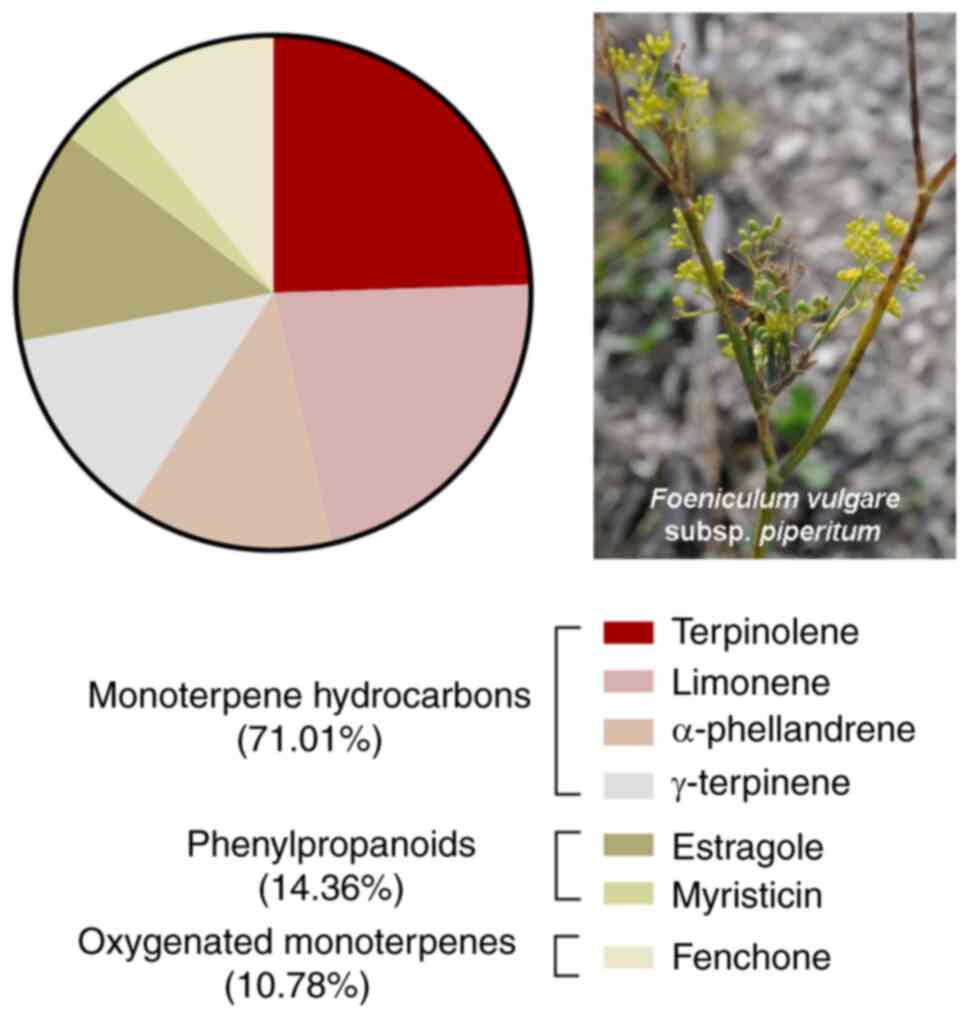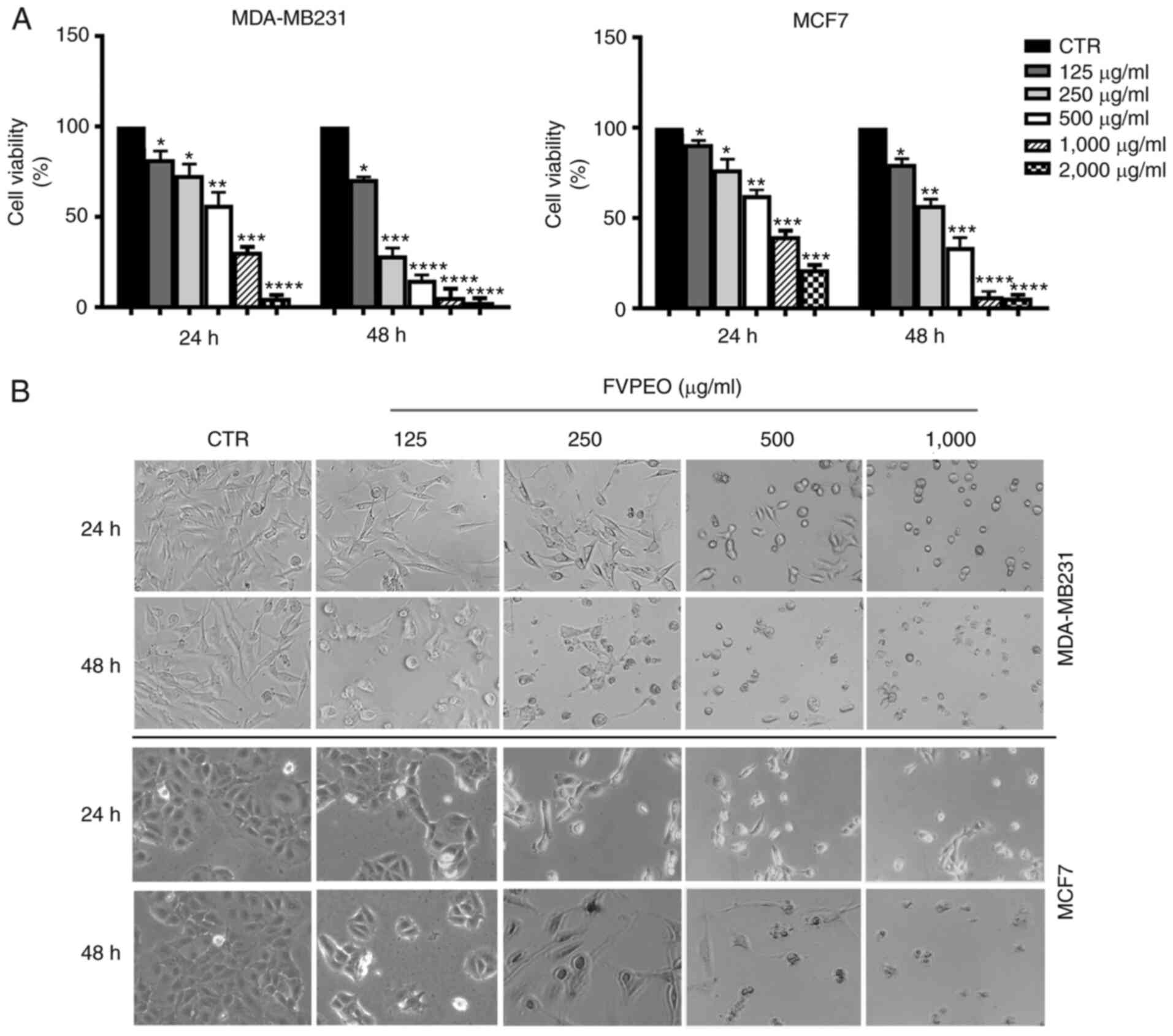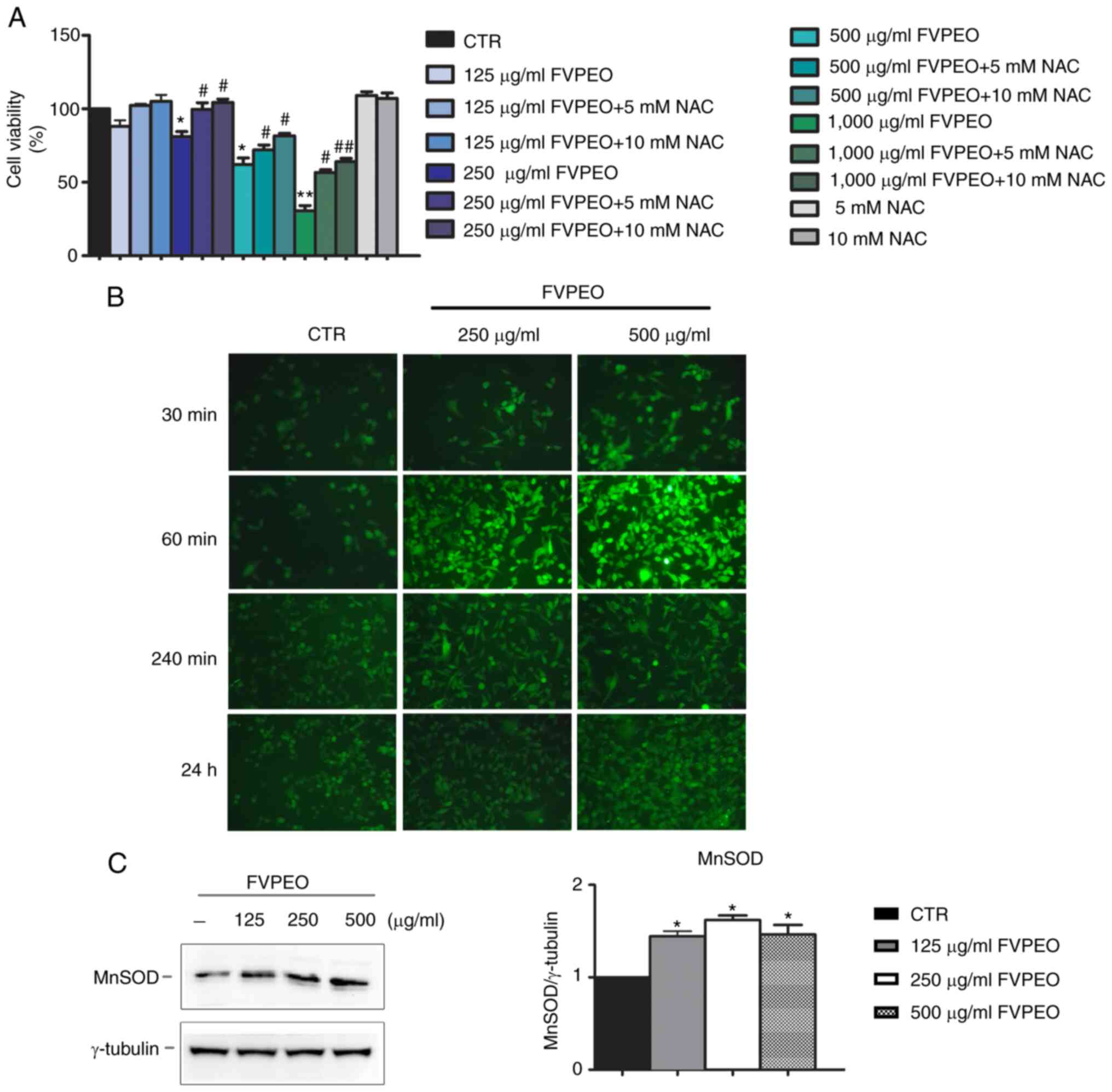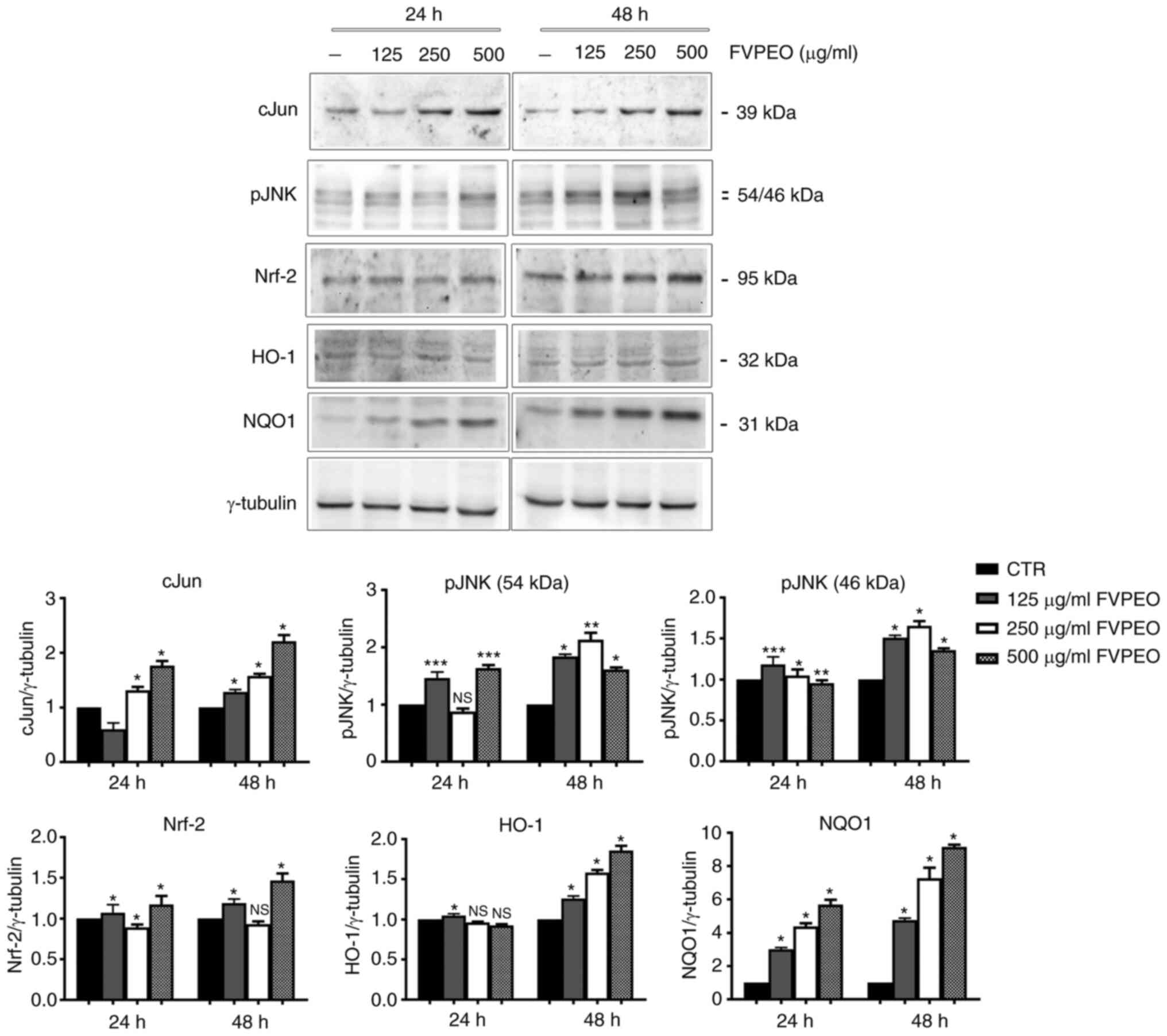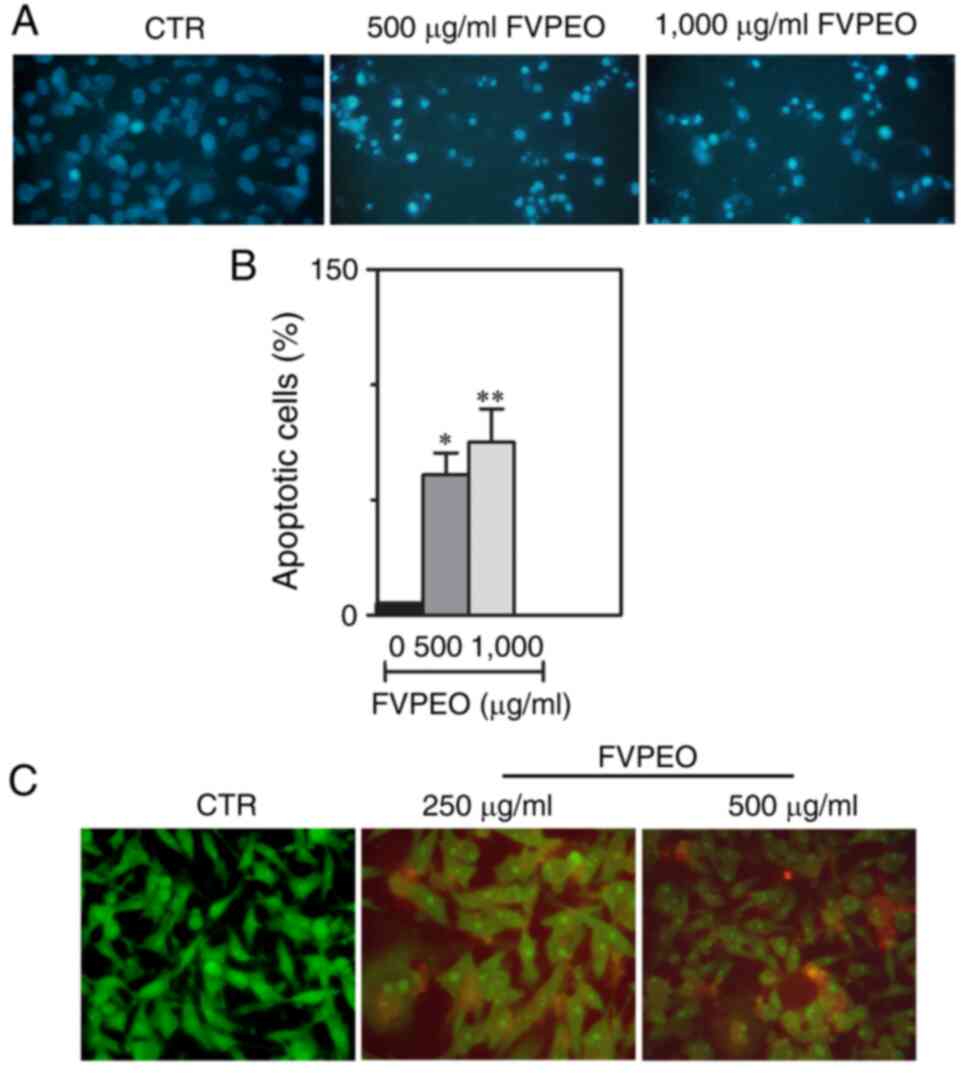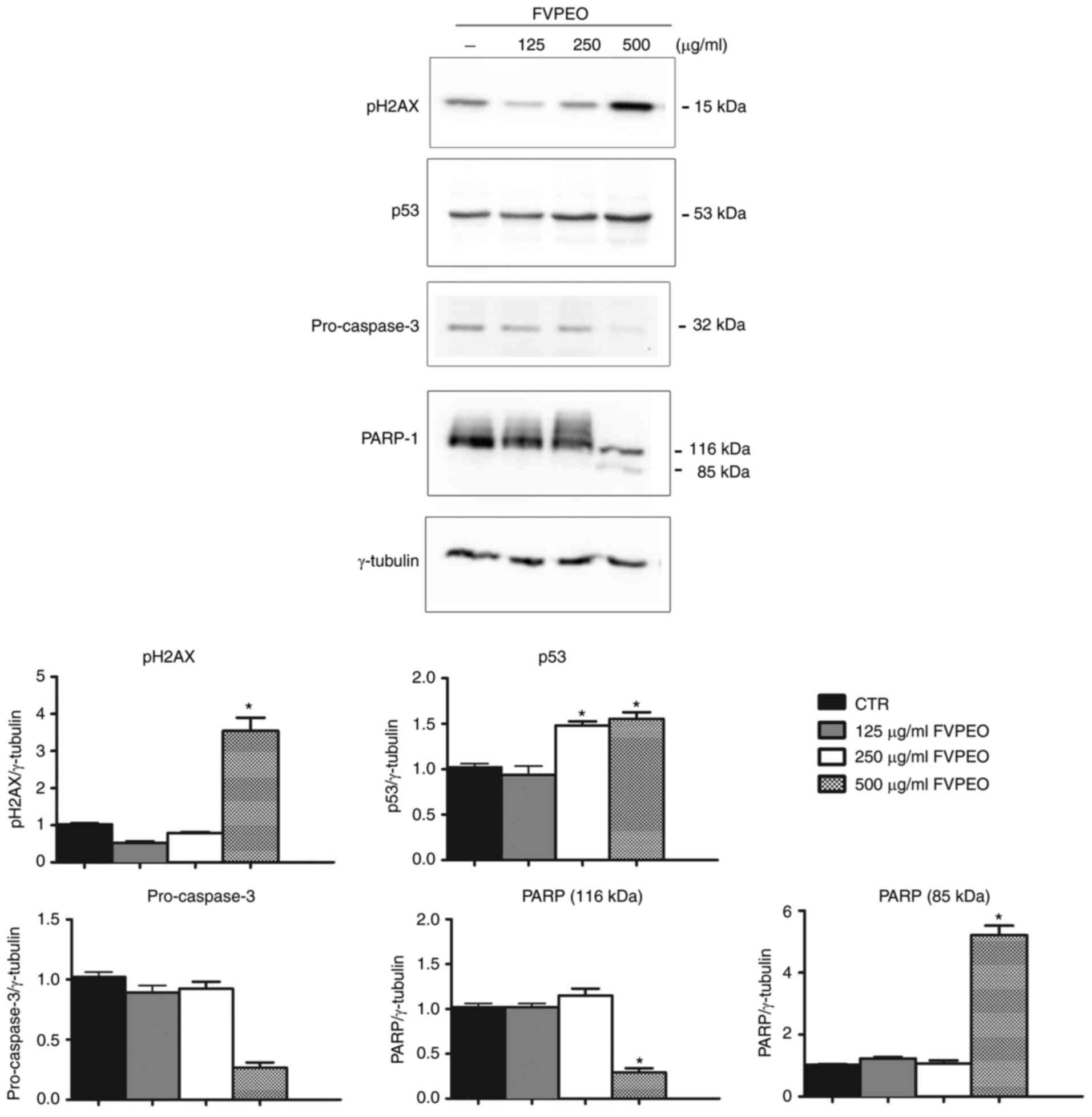|
1
|
Badgujar SB, Patel VV and Bandivdekar AH:
Foeniculum vulgare Mill: A review of its botany,
phytochemistry, pharmacology, contemporary application, and
toxicology. Bio Med Res Int. 2014:8426742014.
|
|
2
|
Garg C, Khan SA, Ansari SH, Suman A and
Garg M: Chemical composition, therapeutic potential and
perspectives of Foeniculum vulgare. Pharmacogn Rev.
3:346–352. 2009.
|
|
3
|
He W and Huang B: A review of chemistry
and bioactivities of a medicinal spice: Foeniculum vulgare.
J Med Plants Res. 5:3595–3600. 2011.
|
|
4
|
Díaz-Maroto MC, Pérez-Coello MS, Esteban J
and Sanz J: Comparison of the volatile composition of wild fennel
samples (Foeniculum vulgare Mill.) from central Spain. J
Agric Food Chem. 54:6814–6818. 2006. View Article : Google Scholar
|
|
5
|
Guillén MD and Manzanos MJ: A study of
several parts of the plant Foeniculum vulgare as a source of
compounds with industrial interest. Food Res Int. 29:85–88. 1996.
View Article : Google Scholar
|
|
6
|
Guarrera PM and Savo V: Perceived health
properties of wild and cultivated food plants in local and popular
traditions of Italy: A review. J Ethnopharmacol. 146:659–680. 2013.
View Article : Google Scholar
|
|
7
|
Rahimi R and Ardekani MR: Medicinal
properties of Foeniculum vulgare Mill. in traditional
Iranian medicine and modern phytotherapy. Chin J Integr Med.
19:73–79. 2013. View Article : Google Scholar : PubMed/NCBI
|
|
8
|
Amini F, Marzban M and Salehi A: The
effect of Foeniculum vulgare on dysmenorrhea; a systematic
review. Planta Med. 82 (Suppl 1):S1–S381. 2016. View Article : Google Scholar
|
|
9
|
Guarrera PM, Salerno G and Caneva G: Folk
phytotherapeutical plants from Maratea area (Basilicata, Italy). J
Ethnopharmacol. 99:367–378. 2005. View Article : Google Scholar
|
|
10
|
Musa Özcan M and Claude Chalchat J: Effect
of collection time on chemical composition of the essential oil of
Foeniculum vulgare subsp. piperitum growing wild in
Turkey. Eur Food Res Technol. 224:279–281. 2006. View Article : Google Scholar
|
|
11
|
Muckensturm B, Foechterlen D, Reduron JP,
Danton P and Hildenbrand M: Phytochemical and chemotaxonomic
studies of Foeniculum vulgare. Biochem Syst Ecol.
25:353–358. 1997. View Article : Google Scholar
|
|
12
|
Ilardi V, Badalamenti N and Bruno M:
Chemical composition of the essential oil from different vegetative
parts of Foeniculum vulgare subsp. piperitum (Ucria)
Coutinho (Umbelliferae) growing wild in sicily. Nat Prod Res. 1–11.
2021.(Epub ahead of print). View Article : Google Scholar
|
|
13
|
Tripathi P, Tripathi R, Patel RK and
Pancholi SS: Investigation of antimutagenic potential of
Foeniculum vulgare essential oil on cyclophosphamide induced
genotoxicity and oxidative stress in mice. Drug Chem Toxicol.
36:35–41. 2013. View Article : Google Scholar
|
|
14
|
Pradhan M, Sribhuwaneswari S, Karthikeyan
D, Minz S, Sure P, Chandu AN, Mishra U, Kamalakannan K,
Saravanankumar A and Sivakumar T: In-vitro cytoprotection activity
of Foeniculum vulgare and helicteres isora in cultured human
blood lymphocytes and antitumour activity against B16F10 melanoma
cell line. Res J Pharm Technol. 1:450–452. 2008.
|
|
15
|
Elkady AI: Anethole inhibits the
proliferation of human prostate cancer cells via induction of cell
cycle arrest and apoptosis. Anticancer Agents Med Chem. 18:216–236.
2018. View Article : Google Scholar : PubMed/NCBI
|
|
16
|
Ke W, Zhao X and Lu Z: Foeniculum
vulgare seed extract induces apoptosis in lung cancer cells
partly through the down-regulation of Bcl-2. Biomed Pharmacother.
135:1112132021. View Article : Google Scholar : PubMed/NCBI
|
|
17
|
Ke W, Wang H, Zhao X and Lu Z:
Foeniculum vulgare seed extract exerts anti-cancer effects
on hepatocellular carcinoma. Food Funct. 12:1482–1497. 2021.
View Article : Google Scholar
|
|
18
|
Mohamad RH, El-Bastawesy AM, Abdel-Monem
MG, Noor AM, Al-Mehdar HA, Sharawy SM and El-Merzabani MM:
Antioxidant and anticarcinogenic effects of methanolic extract and
volatile oil of fennel seeds (Foeniculum vulgare). J Med
Food. 14:986–1001. 2011. View Article : Google Scholar : PubMed/NCBI
|
|
19
|
Lo Galbo V, Lauricella M, Giuliano M,
Emanuele S, Carlisi D, Calvaruso G, De Blasio A, Di Liberto D and
D'Anneo A: Redox imbalance and mitochondrial release of apoptogenic
factors at the forefront of the antitumor action of mango peel
extract. Molecules. 26:43282021. View Article : Google Scholar : PubMed/NCBI
|
|
20
|
Liu K, Liu PC, Liu R and Wu X: Dual AO/EB
staining to detect apoptosis in osteosarcoma cells compared with
flow cytometry. Med Sci Monit Basic Res. 21:15–20. 2015. View Article : Google Scholar : PubMed/NCBI
|
|
21
|
Pratelli G, Carlisi D, D'Anneo A, Maggio
A, Emanuele S, Palumbo Piccionello A, Giuliano M, De Blasio A,
Calvaruso G and Lauricella M: Bio-waste products of Mangifera
indica L. reduce adipogenesis and exert antioxidant effects on
3T3-L1 cells. Antioxidants (Basel). 11:3632022. View Article : Google Scholar : PubMed/NCBI
|
|
22
|
Lauricella M, Lo Galbo V, Cernigliaro C,
Maggio A, Palumbo Piccionello A, Calvaruso G, Carlisi D, Emanuele
S, Giuliano M and D'Anneo A: The anti-cancer effect of Mangifera
indica L. peel extract is associated to γH2AX-mediated
apoptosis in colon cancer cells. Antioxidants (Basel). 8:4222019.
View Article : Google Scholar
|
|
23
|
Hero T, Bühler H, Kouam PN,
Priesch-Grzeszowiak B, Lateit T and Adamietz IA: The
triple-negative breast cancer cell line MDA-MB 231 is specifically
inhibited by the ionophore salinomycin. Anticancer Res.
39:2821–2827. 2019. View Article : Google Scholar : PubMed/NCBI
|
|
24
|
Kahl R, Kampkötter A, Wätjen W and
Chovolou Y: Antioxidant enzymes and apoptosis. Drug Metab Rev.
36:747–762. 2004. View Article : Google Scholar : PubMed/NCBI
|
|
25
|
Meng Q and Xia Y: c-Jun, at the crossroad
of the signaling network. Protein Cell. 2:889–898. 2011. View Article : Google Scholar
|
|
26
|
Chen YR, Meyer CF and Tan TH: Persistent
activation of c-Jun N-terminal kinase 1 (JNK1) in gamma
radiation-induced apoptosis. J Biol Chem. 271:631–634. 1996.
View Article : Google Scholar : PubMed/NCBI
|
|
27
|
Bellezza I, Giambanco I, Minelli A and
Donato R: Nrf2-Keap1 signaling in oxidative and reductive stress.
Biochim Biophys Acta Mol Cell Res. 1865:721–733. 2018. View Article : Google Scholar : PubMed/NCBI
|
|
28
|
Zhao H, Huang X, Halicka HD and
Darzynkiewicz Z: Detection of histone H2AX phosphorylation on
Ser-139 as an indicator of DNA damage. Curr Protoc Cytom.
89:e552019.PubMed/NCBI
|
|
29
|
Burma S, Chen BP, Murphy M, Kurimasa A and
Chen DJ: ATM phosphorylates histone H2AX in response to DNA
double-strand breaks. J Biol Chem. 276:42462–42467. 2001.
View Article : Google Scholar : PubMed/NCBI
|
|
30
|
Chen J: The cell-cycle arrest and
apoptotic functions of P53 in tumor initiation and progression.
Cold Spring Harb Perspect Med. 6:a0261042016. View Article : Google Scholar : PubMed/NCBI
|
|
31
|
Porter AG and Jänicke RU: Emerging roles
of caspase-3 in apoptosis. Cell Death Differ. 6:99–104. 1999.
View Article : Google Scholar : PubMed/NCBI
|
|
32
|
Chaitanya GV, Steven AJ and Babu PP:
PARP-1 cleavage fragments: Signatures of cell-death proteases in
neurodegeneration. Cell Commun Signal. 8:312010. View Article : Google Scholar
|
|
33
|
Lauricella M, Emanuele S, Calvaruso G,
Giuliano M and D'Anneo A: Multifaceted health benefits of
Mangifera indica L. (Mango): The inestimable value of
orchards recently planted in sicilian rural areas. Nutrients.
9:5252017. View Article : Google Scholar
|
|
34
|
Emanuele S, Notaro A, Palumbo Piccionello
A, Maggio A, Lauricella M, D'Anneo A, Cernigliaro C, Calvaruso G
and Giuliano M: Sicilian litchi fruit extracts induce autophagy
versus apoptosis switch in human colon cancer cells. Nutrients.
10:14902018. View Article : Google Scholar
|
|
35
|
Allegra M, D'Anneo A, Frazzitta A, Restivo
I, Livrea MA, Attanzio A and Tesoriere L: The phytochemical
indicaxanthin synergistically enhances cisplatin-induced apoptosis
in HeLa cells via oxidative stress-dependent p53/p21waf1
axis. Biomolecules. 10:9942020. View Article : Google Scholar
|
|
36
|
Demain AL and Vaishnav P: Natural products
for cancer chemotherapy. Microb Biotechnol. 4:687–699. 2014.
View Article : Google Scholar
|
|
37
|
Dholwani KK, Saluja AK, Gupta AR and Shah
DR: A review on plant-derived natural products and their analogs
with anti-tumor activity. Indian J Pharmacol. 40:492008. View Article : Google Scholar
|
|
38
|
Ataollahi MR, Sharifi J, Paknahad MR and
Paknahad A: Breast cancer and associated factors: A review. J Med
Life. 8:6–11. 2015.PubMed/NCBI
|
|
39
|
Fahad Ullah M: Breast cancer: Current
perspectives on the disease status. Ahmad A; Breast Cancer
Metastasis and Drug Resistance, : Advances in Experimental Medicine
and Biology. 1152. Springer; Cham: pp. 51–64. 2019, View Article : Google Scholar : PubMed/NCBI
|
|
40
|
Waks AG and Winer EP: Breast cancer
treatment: A review. JAMA. 321:288–300. 2019. View Article : Google Scholar : PubMed/NCBI
|
|
41
|
Medina MA, Oza G, Sharma A, Arriaga LG,
Hernández Hernández JM, Rotello VM and Ramirez JT: Triple-negative
breast cancer: A review of conventional and advanced therapeutic
strategies. Int J Environ Res Public Health. 17:20782020.
View Article : Google Scholar
|
|
42
|
Emanuele S, D'Anneo A, Calvaruso G,
Cernigliaro C, Giuliano M and Lauricella M: The double-edged sword
profile of redox signaling: Oxidative events as molecular switches
in the balance between cell physiology and cancer. Chem Res
Toxicol. 31:201–210. 2018. View Article : Google Scholar
|
|
43
|
Ghosh N, Das A, Chaffee S, Roy S and Sen
CK: Reactive oxygen species, oxidative damage and cell death.
Chatterjee S, Jungraithmayr W and Bagchi D: Immunity and
Inflammation in Health and Disease; Emerging Roles of
Nutraceuticals and Functional Foods in Immune Support. Elsevier;
pp. 45–55. 2018
|
|
44
|
Tonelli C, Chio IIC and Tuveson DA:
Transcriptional regulation by Nrf2. Antioxid. Redox Signal.
29:1727–1745. 2018. View Article : Google Scholar
|
|
45
|
Mizumoto A, Ohashi S, Kamada M, Saito T,
Nakai Y, Baba K, Hirohashi K, Mitani Y, Kikuchi O, Matsubara J, et
al: Combination treatment with highly bioavailable curcumin and
NQO1 inhibitor exhibits potent antitumor effects on esophageal
squamous cell carcinoma. J Gastroenterol. 54:687–698. 2019.
View Article : Google Scholar
|
|
46
|
Braicu C, Mehterov N, Vladimirov B,
Sarafian V, Nabavi SM, Atanasov AG and Berindan-Neagoe I:
Nutrigenomics in cancer: Revisiting the effects of natural
compounds. Semin Cancer Biol. 46:84–106. 2017. View Article : Google Scholar
|
|
47
|
Patiño-Morales CC, Soto-Reyes E,
Arechaga-Ocampo E, Ortiz-Sánchez E, Antonio-Véjar V,
Pedraza-Chaverri J and García-Carrancá A: Curcumin stabilizes p53
by interaction with NAD(P)H:Quinone oxidoreductase 1 in
tumor-derived cell lines. Redox Biol. 28:1013202020. View Article : Google Scholar
|
|
48
|
El-Garawani I, El Nabi SH, Nafie E and
Almeldin S: Foeniculum vulgare and pelargonium graveolens
essential oil mixture triggers the cell cycle arrest and apoptosis
in MCF-7 cells. Anticancer Agents Med Chem. 19:1103–1113. 2019.
View Article : Google Scholar : PubMed/NCBI
|















